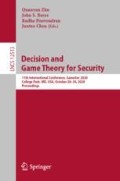Abstract
Security games are a defender-attacker game-theoretic model where the defender determines how to allocate scarce resources to protect valuable targets against the attacker. A majority of existing work has focused on the one-shot game setting in which the attacker only attacks once. However, in many real-world scenarios, the attacker can perform multiple attacks in a sequential manner and leverage observable effects of these attacks for better attack decisions in the future. Recent work shows that in order to provide effective protection over targets, the defender has to take the prospect of sequential attacks into consideration. The algorithm proposed by existing work to handle sequential attacks, however, can only scale up to two attacks at most. We extend this line of work and focus on developing new scalable algorithms for solving the zero-sum variant of security games. We formulate security games with sequential attacks as a one-sided partially observable stochastic games. We show that the uncertainty about the state in the game can be modeled compactly and we can use variants of heuristic search value iteration algorithm for solving these games. We give two variants of the algorithm – an exact one and a heuristic formulation where the resource reallocation possibilities of the defender are simplified. We experimentally compare these two variants of the algorithm and show that the heuristic variant is typically capable of finding high-quality strategies while scaling to larger scenarios compared to the exact variant.
This research was supported by the Czech Science Foundation (no. 19-24384Y) and by the OP VVV MEYS funded project CZ.02.1.01/0.0/0.0/16 019/0000765 “Research Center for Informatics”.
Access this chapter
Tax calculation will be finalised at checkout
Purchases are for personal use only
Notes
- 1.
For theoretical results and proofs refer to [11].
- 2.
Note that this can be generalized even further so that costs correspond to, for example, distances between the targets in a graph.
- 3.
Note that only reallocation actions resulting in situations where no target is covered by more than one resource are assumed.
References
Fang, F., et al.: Deploying PAWS: Field optimization of the protection assistant for wildlife security. In: IAAI (2016)
Horák, K., Bošanský, B., Kiekintveld, C., Kamhoua, C.: Compact representation of value function in partially observable stochastic games. IJCAI (2019)
Horák, K., Bošanský, B., Tomášek, P., Kiekintveld, C., Kamhoua, C.: Optimizing honeypot strategies against dynamic lateral movement using partially observable stochastic games. Comput. Secur. 87, 101579 (2019). https://doi.org/10.1016/j.cose.2019.101579
Horák, K., Bošanský, B., Pěchouček, M.: Heuristic search value iteration for one-sided partially observable stochastic games. In: 31st AAAI Conference on Artificial Intelligence, pp. 558–564 (2017)
Kiekintveld, C., Jain, M., Tsai, J., Pita, J., Ordóñez, F., Tambe, M.: Computing optimal randomized resource allocations for massive security games. In: Proceedings of the 8th International Conference on Autonomous Agents and Multiagent Systems, pp. 689–696 (2009). http://portal.acm.org/citation.cfm?id=1558013.1558108
Nguyen, T.H., et al.: CAPTURE: A new predictive anti-poaching tool for wildlife protection. In: Proceedings of the 2016 International Conference on Autonomous Agents and Multiagent Systems, pp. 767–775. AAMAS, Richland, SC (2016). http://dl.acm.org/citation.cfm?id=2937029.2937037
Nguyen, T.H., Yadav, A., Bošanský, B., Liang, Yu.: Tackling sequential attacks in security games. In: Alpcan, T., Vorobeychik, Y., Baras, J.S., Dán, G. (eds.) GameSec 2019. LNCS, vol. 11836, pp. 331–351. Springer, Cham (2019). https://doi.org/10.1007/978-3-030-32430-8_20
Shieh, E., et al.: PROTECT: A deployed game theoretic system to protect the ports of the United States. In: AAMAS (2012)
Sinha, A., Fang, F., An, B., Kiekintveld, C., Tambe, M.: Stackelberg security games: Looking beyond a decade of success. In: IJCAI, pp. 5494–5501 (2018)
Smith, T., Simmons, R.: Heuristic search value iteration for POMDPs. In: 20th Conference on Uncertainty in Artificial Intelligence (UAI), pp. 520–527 (2004)
Smith, T., Simmons, R.: Heuristic search value iteration for POMDPs: Detailed theory and results. Technical report, Robotics Institute, Carnegie Mellon University (2004)
Smith, T., Simmons, R.: Point-based POMDP algorithms: Improved analysis and implementation. In: 21st Conference on Uncertainty in Artificial Intelligence (UAI), pp. 542–549 (2005)
Tambe, M. (ed.): Security and Game Theory: Algorithms, Deployed Systems, Lessons Learned. Cambridge University Press, Cambridge (2011)
Author information
Authors and Affiliations
Corresponding author
Editor information
Editors and Affiliations
Rights and permissions
Copyright information
© 2020 Springer Nature Switzerland AG
About this paper
Cite this paper
Tomášek, P., Bošanský, B., Nguyen, T.H. (2020). Using One-Sided Partially Observable Stochastic Games for Solving Zero-Sum Security Games with Sequential Attacks. In: Zhu, Q., Baras, J.S., Poovendran, R., Chen, J. (eds) Decision and Game Theory for Security. GameSec 2020. Lecture Notes in Computer Science(), vol 12513. Springer, Cham. https://doi.org/10.1007/978-3-030-64793-3_21
Download citation
DOI: https://doi.org/10.1007/978-3-030-64793-3_21
Published:
Publisher Name: Springer, Cham
Print ISBN: 978-3-030-64792-6
Online ISBN: 978-3-030-64793-3
eBook Packages: Computer ScienceComputer Science (R0)

